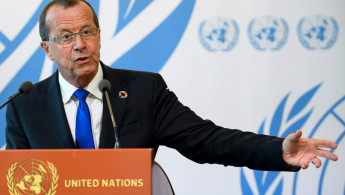UN Libya envoy reveals 'road map to peace'
The UN envoy to Libya, Martin Kobler, revealed details of ‘A Road Map to Peace’ to The New Arab on Sunday, a recent initiative on resolving the Libyan crisis.
"The idea came after my meetings with the various Libyan parties and neighbouring countries, which showed that there is consensus on moving forward in the implementation of the Libyan political agreement," Kobler told The New Arab, adding that "all parties agree that must amendments and revisions made to allow progress towards peace and stability."
"The evidence is that we have seen the House of Representatives and the Supreme Council of the State forming dialogue committees to identify the main issues in the Libyan political agreement, which require further talks, a consensus on the agenda of these talks and decisions on the necessary amendments to allow the implementation of the agreement."
Asked about whether his initiative was presented to the Libyan parties and whether they were binding on them, Kobler said that "the amendments and the national dialogue belong to the Libyans, and are led by Libyans”, noting the UN is taking on a 'facilitator' role.
On the next step of the initiative, the UN envoy said: "We are in the process of putting the elements of the road map, which we will discuss first with the concerned security, political and community actors, before announcing details.
“I think there is growing consensus that limited amendments should be made to the Libyan political agreement," he said.
Last month the UN envoy to Libya announced a new initiative to resolve the Libyan crisis.
“First, the Libyan Political Agreement is the only basis for ending the conflict and any amendments must be agreed upon by all Libyans,” Kobler tweeted in May.
“Second, Creating one security apparatus, and all security departments must be prohibited from using violence. Third, the Libyan economic and financial situations must be stable with more cooperation between financial and economic institutions and the Presidential Council.” Kobler wrote.
The UN envoy went on to suggest the fourth item focused on engaging all of Libya’s conflicting parties in the national reconciliation drive and said local governing bodies must develop, and the elected mayors must be given the authorities and financial support to allow them to make a change.
“Finally Libya’s neighbouring countries should cooperate to bring the Libyan political and military stakeholders to the dialogue table.” Kobler concluded.
The Libyan civil war began in February 2011 after a series of protests were brutally suppressed by the regime's security forces.
It led to an armed rebellion backed by NATO and Arab countries against Colonel Muammar Gaddafi, which saw the eventual overthrow of the regime and death of the long-time leader.
Since then, Libya has been fragmented by rival authorities and militias, including some linked to al-Qaeda and the Islamic State group.
But a recent meeting between Sarraj and Haftar in Abu Dhabi has offered hope that a peace deal between Libya's two largest factions could be agreed.





 Follow the Middle East's top stories in English at The New Arab on Google News
Follow the Middle East's top stories in English at The New Arab on Google News
![Israeli forces ordered bombed Gaza's Jabalia, ordering residents to leave [Getty]](/sites/default/files/styles/image_330x185/public/2176418030.jpeg?h=a5f2f23a&itok=_YGZaP1z)

